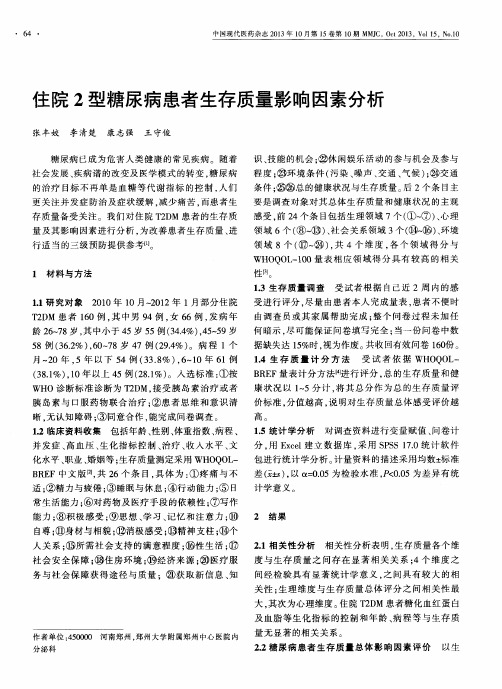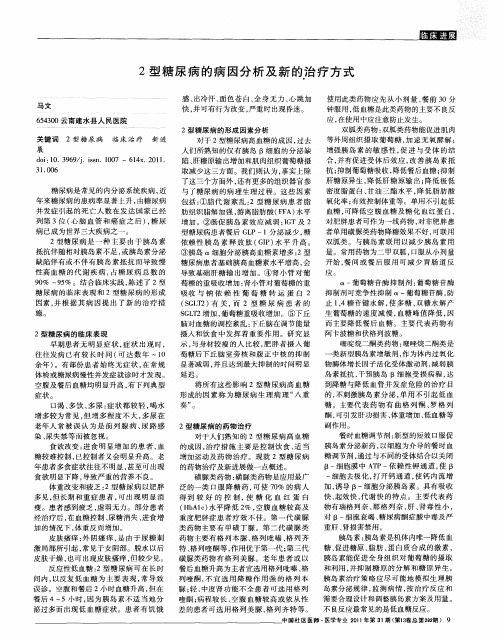2型糖尿病不同发展阶段影响因素分析
- 格式:pdf
- 大小:139.67 KB
- 文档页数:2

糖尿病发展有四阶段出现消渴已是中后期
日前,第九届广东省中医内分泌专业委员会学术交流会在深召开,国内的中医内分泌专家聚深,就糖尿病的防治进行了研讨。
中华中医药学会糖尿病专业委员会主任委员、中国中医科学院首席研究员、博士生导师仝小林指出,在糖尿病治疗上,有的中医认为糖尿病=消渴,糖尿病都是虚证。
实际上,这些都是认识误区,从辨证来看,糖尿病发展有四个阶段:郁、热、虚、损。
深圳特区报记者余海蓉
实习生沈逸云通讯员黄淑芬
“糖尿病=消渴”是误区仝小林说,传统认为,糖尿病等于消渴。
这其实是中医认识的一个误区。
仝小林指出,现代糖尿病的临床具有以下特点:作为糖尿病的主体人群,2型糖尿病占90%以上,肥胖者又是2型糖尿病的主体。
80%的2型糖尿病患者表现为肥胖或超重。
肥胖2型糖尿病发展为消渴,大体要经历三个阶段:肥胖——脾瘅——消渴。
《素问·奇病论》记载:脾瘅,此肥美之所发也,此人必数食甘美而多肥也。
肥者令人内热,甘者令人中满,故其气上溢,转为消渴。
这就说明古代糖尿病的主体人群和现代一样,肥胖。
古代糖尿病诊断主要靠特征性症状消渴(即多饮、多食、多尿、体重减轻“三少一多”)来辨识,现代医学可以查血糖来诊断,血糖控制良好及糖尿病初期患者基本不会出现消渴,真正有消渴症状的只占13%,而有了这个症状也已经是糖尿病的中晚期。
这也正是为什么用治消渴的方法治不了肥胖2型。



2型糖尿病病人自我管理行为现状及影响因素分析杜精睛1,李玥桐1,李红玉1*,黄芳2*1.锦州医科大学,辽宁121000;2.台州学院医学院Status quo and influencing factors of self⁃management behaviors in patients with type2diabetes mellitusDU Jingjing,LI Yuetong,LI Hongyu,HUANG FangJinzhou Medical University,Liaoning121000ChinaCorresponding Author LI Hongyu,E⁃mail:*****************;HUANG Fang,E⁃mail:**************** Abstract Objective:To explore the status quo and influencing factors of self⁃management behaviors in patients with type2diabetes mellitus.Methods:The General Information Questionnaire,Summary of Diabetes Self⁃Care Activities(SDSCA),Adaptation,Partnership,Growth,Affection,and Resolve(APGAR)Family Care Questionnaire,and Rosenberg Self-Esteem Scale(RSES)were used to investigate the type2diabetes patients who visited the endocrinology department of a tertiary grade A hospital in Jinzhou from April to July2021.Results:The total scores of SDSCA,RSES,and APGAR of patients with type2diabetes were(40.83±12.51)points,(28.27±4.50)points,and(5.72±2.65)points,respectively.The level of self⁃management among72cases(21.2%)was poor,253cases(74.6%)were moderate,and14cases(4.1%)were good.The multiple linear regression analysis results showed that living style,number of comorbidities,APGAR score,and self⁃esteem were the most important influencing factors in the self⁃management behavior of diabetic patients(P<0.05).Conclusions:The self⁃management behavior of patients with type2diabetes is moderate. Nursing staff should take individualized and targeted intervention measures to improve patients'self⁃management behavior,change their lifestyles,and improve their quality of life.Keywords type2diabetes;self⁃management;family care;self-esteem;nursing;influencing factor摘要目的:探讨2型糖尿病病人自我管理行为现状及影响因素。

糖尿病管理中分阶段管理对2型糖尿病患者自护能力以及预后情况的影响糖尿病是一种严重的慢性疾病,患者在日常生活中需要进行严格的自我管理,以维持血糖水平的稳定。
对于2型糖尿病患者,分阶段管理是一种常见的管理方式,通过分阶段的管理措施对糖尿病患者进行干预和教育,提高患者的自护能力,进而改善患者的预后情况。
本文将探讨分阶段管理对2型糖尿病患者自护能力以及预后情况的影响。
1. 2型糖尿病患者的自护能力2型糖尿病患者由于身体的代谢功能异常,容易导致血糖水平的波动,因此需要在日常生活中进行严格的自我管理。
自我管理能力是指患者对自身疾病的认知和管理技能,包括监测血糖、饮食控制、药物管理、锻炼等方面。
良好的自护能力可以帮助患者更好地控制疾病,减少并发症的发生,提高生活质量。
2. 分阶段管理对自护能力的影响分阶段管理是指根据患者的病情和自我管理能力的不同,制定不同的管理方案,对患者进行个性化的指导和干预。
通过分阶段管理可以更好地帮助患者提高自护能力,包括对疾病的认知和相关技能的培训。
在早期阶段,重点是对患者进行疾病知识的普及和相关技能的培训,帮助患者建立自我管理的信心和能力。
随着病情的发展,患者需要不断地调整自我管理的策略,并且在需要时寻求专业的帮助和支持。
通过分阶段管理的指导和干预,可以有效提高患者的自护能力,帮助他们更好地控制疾病,减少并发症的发生。
3. 分阶段管理对预后情况的影响分阶段管理不仅可以提高患者的自护能力,还可以改善患者的预后情况。
通过对患者进行个性化的指导和干预,可以提高患者对疾病的认知和管理能力,进而减少并发症的发生,延缓疾病的进展。
分阶段管理还可以帮助患者建立良好的生活方式和饮食习惯,提高患者的生活质量。
研究表明,接受分阶段管理的2型糖尿病患者,其预后情况明显优于未接受管理的患者,包括血糖控制、并发症的发生率和生活质量等方面。

2型糖尿病文献综述范文模板例文English Answer:Introduction.Type 2 diabetes mellitus (T2DM) is a chronic metabolic disorder characterized by hyperglycemia and insulin resistance. It is a major global health concern, affecting approximately 463 million people worldwide. T2DM is a highly prevalent disease with significant morbidity and mortality, accounting for 1.5 million deaths annually. The disease is associated with various complications, including cardiovascular disease, nephropathy, neuropathy, and retinopathy.Pathophysiology.Insulin resistance is the primary defect in T2DM. Insulin resistance refers to the reduced responsiveness of tissues, particularly muscle and liver, to the metabolicactions of insulin. As a result, glucose uptake and utilization are impaired. The pancreas initially compensates by increasing insulin secretion to maintain glucose homeostasis. However, over time, the pancreas fails to meet the increased insulin demand, leading to hyperglycemia. Beta-cell dysfunction is another factor contributing to T2DM, characterized by impaired insulin secretion and reduced insulin sensitivity.Risk Factors.Various factors contribute to the development of T2DM, including:Genetics: Family history and specific genetic variants increase the risk of T2DM.Obesity: Obesity is strongly linked to T2DM, as it promotes insulin resistance and inflammation.Age: The risk of T2DM increases with age, especially after 45 years.Physical inactivity: Regular physical activity improves insulin sensitivity and reduces the risk of T2DM.Unhealthy diet: A diet high in processed foods, sugary drinks, and saturated fats can promote insulin resistance.Certain ethnicities: Individuals of certain ethnicities, such as African Americans, Hispanics, and Native Americans, have a higher prevalence of T2DM.Other medical conditions: Conditions like Polycystic Ovary Syndrome (PCOS) and Gestational Diabetes Mellitus (GDM) can increase the risk of developing T2DM.Symptoms.Early stages of T2DM may be asymptomatic or have mild symptoms, such as:Increased thirst and urination.Hunger and weight loss.Fatigue and weakness.Blurred vision.Frequent infections.Diagnosis.T2DM is diagnosed based on clinical symptoms and laboratory tests. The primary diagnostic criteria include:Fasting plasma glucose (FPG) ≥ 126mg/dL (7.0mmol/L)。
初诊2型糖尿病患者微炎症状态影响因素分析沈莹;陈玲【摘要】目的:探讨初诊2型糖尿病患者微炎症状态及相关影响因素。
方法选择2015年3~12月期间我院内分泌科收治的125例初诊2型糖尿病(T2DM)患者纳入观察组,同期50例健康体检者纳入对照组,比较两组受检者的年龄、性别、体质量指数(BMI)、血脂、血清C反应蛋白(CRP)水平等临床资料,并分析影响观察组患者血清CRP水平的相关因素。
结果观察组患者的BMI、甘油三酯(TG)、总胆固醇(TC)及CRP分别为(26.14±3.23) kg/m2、(2.26±0.55) mmol/L、(5.99±1.45) mmol/L、(4.61±2.13) mg/L,均明显高于对照组的(23.12±3.14) kg/m2、(1.44±0.47) mmol/L、(4.18±1.18) mmol/L、(1.18±0.62) mg/L,差异均有统计学意义(P<0.05);观察组患者血清CRP水平与BMI、胰岛素抵抗指数(HOMA-IR)呈正相关性(r=0.686、0.543,P<0.05),与胰岛β细胞功能(HOMA-B)呈负相关性(r=-0.517,P<0.05)。
结论 CRP参与T2DM的发生及发展,而T2DM患者微炎症状态与患者超重或肥胖、胰岛素抵抗及胰岛β细胞功能关系密切。
【期刊名称】《海南医学》【年(卷),期】2016(027)024【总页数】2页(P4085-4086)【关键词】2型糖尿病;C反应蛋白;胰岛素抵抗;影响因素【作者】沈莹;陈玲【作者单位】上海交通大学医学院附属瑞金医院卢湾分院内分泌科,上海200020;上海交通大学医学院附属瑞金医院卢湾分院内分泌科,上海 200020【正文语种】中文【中图分类】R587.12型糖尿病(type 2 diabetes mellitus,T2DM)是一种主要特征为血糖增高的常见慢性内分泌代谢紊乱疾病,本病的病理生理改变早期以胰岛素抵抗为主,后期则以胰岛素分泌不足为主,且胰岛素抵抗贯穿整个病程[1]。
2型糖尿病患者饮食治疗依从性及影响因素的调查目的调查并分析2型糖尿病患者饮食治疗依从性及影响因素。
方法选取该院在2012年3月—2015年8月收治的158例2型糖尿病患者作為研究对象,通过方便取样的方法,采用饮食不依从性问卷,抑郁自评量表,自我效能量表,社会支持评定量表等作为主要研究工具,对所有患者的饮食依从性和对其产生影响的相关因素进行调查,并作分析。
结果经过调查显示,2型糖尿病患者在遵医嘱对饮食进行控制,按照定时定量的原则进餐,对每餐食物进行称重,采用食物交换份法安排每日的饮食等方面的依从性分别是35.44%、43.67%、17.72%和9.49%,其抑郁水平、自我效能水平、社会支持水平、付费形式、运动状况、经济状况及是否存在并发症和病程长等是2型糖尿病患者饮食依从性的主要影响因素。
结论2型糖尿病患者的饮食依从性相对较差,特别是采用食物交换份法和称量每餐食物方面依从性特别差,而其饮食依从性的影响因素是来自于多方面的,主要为患者的抑郁水平、自我效能水平、社会支持水平、付费形式、运动状况、经济状况及是否存在并发症和病程长等,需要采取有效的针对性措施对患者进行干预,以便于更好的控制其病情的发展。
标签:2型糖尿病;饮食治疗;依从性临床上,我们将以慢性血糖水平升高为主要特征的一种代谢疾病群称之为糖尿病,等疾病具有较高的发病率,而且近些年来我国的经济水平在不断生长,人们的生活方式也在不断的改善,在某种程度上促使这种疾病的发病率大大提升[1]。
这种疾病对于患者来说,具有较重的影响威胁着患者的生命健康,严重的时候可导致患者死亡,因此需要在临床上予以必要的治疗干预[2]。
对于糖尿病患者来说,饮食治疗是对其进行病情控制的有效方法。
而临床糖尿病患者一般为2型糖尿病患者,该研究主要分析2型糖尿病患者饮食治疗的依从性和对其产生影响的主要因素。
结果取得较为满意的成效,现报道如下。
1 资料与方法1.1 一般资料2012年3月—2015年8月,在该院收治的2型糖尿病患者当中抽取158的患者作为研究对象,在所有患者当中男性患者74例,女性患者84例,患者的最大年龄为83岁,最小年龄为52岁,平均年龄为(64.3±12.1)岁。
DOI:10.16658/ki.1672-4062.2023.23.0242型糖尿病患者对疾病进展的恐惧状况探讨及影响因素分析姚春红1,2,王敏1,杨丽11.青岛大学护理学院,山东青岛266000;2.康复大学青岛医院(青岛市市立医院)内分泌科,山东青岛266000[摘要]目的调查2型糖尿病患者对疾病进展的恐惧(fear of progression, FoP)状况并探讨其影响因素。
方法采用方便抽样,选取2021年9月—2023年3月青岛市市立医院内分泌科住院的375例2型糖尿病患者为研究对象,应用一般资料调查表、社会支持量表、恐惧疾病进展简化量表、简易疾病感知量表进行调查。
结果2型糖尿病患者恐惧疾病进展简化量表得分为(32.73±9.77)分,处于中度水平,心理失调(FoP≥34分)的患者比例为46.1%。
多重线性回归分析结果表明,疾病感知、医疗负担情况、治疗方式种类、健康信息来源、客观支持、并发症数量是2型糖尿病患者恐惧疾病进展的影响因素(P<0.05),能解释2型糖尿病患者疾病进展恐惧心理35.7%的变异度。
结论对于2型糖尿病患者,临床医护人员应重视患者的恐惧心理状态,通过关注患者疾病感知等预测因子,适度调控患者对疾病进展的恐惧状况,更大发挥其心理内驱力作用,降低产生心理失调患者的恐惧水平。
[关键词] 2型糖尿病;恐惧疾病进展;影响因素[中图分类号] R59 [文献标识码] A [文章编号] 1672-4062(2023)12(a)-0024-05Exploration of Fear of Disease Progression in Type 2 Diabetes Mellitus Pa⁃tients and Analysis of Influencing FactorsYAO Chunhong1,2, WANG Min1, YANG Li11.College of Nursing, Qingdao University, Qingdao, Shandong Province, 266000 China;2.Department of Endocrinol‐ogy, Qingdao Hospital, University of Health and Rehabilitation Sciences (Qingdao Municipal Hospital), Qingdao, Shan‐dong Province, 266000 China[Abstract] Objective To investigate the Fear of Progression (FoP) status of type 2 diabetes mellitus patients and ex‐plore its influencing factors. Methods Using convenience sampling, 375 cases of type 2 diabetes mellitus patients hos‐pitalized in the Department of Endocrinology of Qingdao Municipal Hospital were investigated from September 2021 to March 2023 as the research object with the application of the General Information Questionnaire, Social Support Scale, Fear of Progression Simplified Scale, and Simple Disease Perception Scale. Results The FoP-Q-SF score of type 2 diabetes mellitus patients was (32.73±9.77) points, which was at a moderate level, and the proportion of pa‐tients with psychological disorders (FoP≥34) was 46.1%. The results of multiple linear regression analysis showed that disease perception, healthcare burden situation, type of treatment, source of health information, objective support, and number of complications were the factors influencing the fear of disease progression in patients with type 2 diabetes mellitus (P<0.05), which explains 35.7% of the variation in the fear of disease progression in patients with type 2 dia‐betes mellitus.Conclusion For patients with type 2 diabetes mellitus, clinical staff should pay attention to the pa‐tients' fear psychological state, by paying attention to the patients' disease perception and other predictive factors, moderately regulate the patients' fear of disease progression, play a greater role in their psychological internal drive, and reduce the level of fear in patients with psychological disorders.[Key words] Type 2 diabetes mellitus; Fear of disease progression; Influencing factors[作者简介]姚春红(1981-),女,硕士在读,副主任护师,研究方向为糖尿病健康管理。